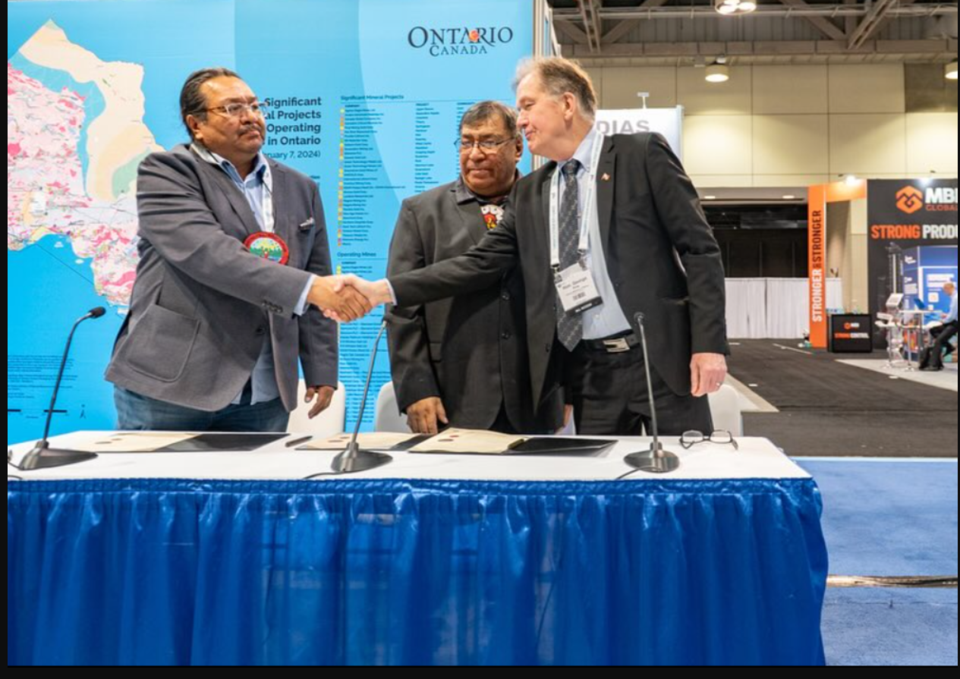Martin Falls Chief Bruce Achneepineskum calls the community's legal action against the federal and provincial governments, insisting on a halt of all development activity in the Ring of Fire, a “moral stand … (about) our ability to to live as a nation on our own terms.”
The remote, fly-in community, on the proposed route to the Far North mineral belt, is seeking an injunction to halt all work until a new “nation-to-nation dialogue” is established.
The remote community claims it’s not been integrally involved in the “planning, benefit-sharing, and governance” of the proposed projects in the James Bay region.
“The Ring of Fire is not just a project, it is our homeland” used by members for hunting and medicinal healing, said Achneepineskum in an Aug. 7 media conference at Queen’s Park.
Marten Falls, located 175 kilometres northeast of Nakina, is a key Indigenous ally in the Ford government’s critical minerals strategy to open up Ontario’s Far North.
The community declares its traditional territory extends into the Ring of Fire area of the James Bay region and says its watershed would be most impacted by any development in the area.
Most importantly, the community is one of the province’s chosen proponents in leading the environmental and technical studies for a proposed north-south road network to the Ring of Fire, which will also connect the community to the provincial highway system for the first time.
Marten Falls is also seeking $300 million in compensation involving a historical grievance against the Ontario government for massive watershed diversion projects carried out during the 1940s and 1950s, which had “devastating impacts” on the community’s way of life.
The community claims these hydro projects were done without First Nation consent.
Marten Falls believes that mining development in the Ring of Fire would exclude them from participating in governance of these projects and would threaten the area’s watershed and their hunting and fishing areas.
The trigger for this legal action appears to be the recent passage of two pieces of controversial federal and provincial legislation, designed to quicken the regulatory pace of resource development.
In the community’s notice of claim against Ontario, it cited the provincial Protect Ontario by Unleashing Our Economy Act and Ottawa’s One Canadian Economy Act, which, if implemented, would deprive them of “many legal and constitutional and fiduciary protections” that they are entitled to.
Marten Falls contends this is broad and arbitrary legislation that violates their rights under Treaty 9, the Canadian Charter of Rights and Freedoms, and the community’s own Anisinaabe law.
This is the second legal challenge by Indigenous communities challenging government's pro-development agenda in as many months. Nine Ontario First Nations are asking Ontario’s Superior Court of Justice to stop the fast-tracking of the legislation, claiming the laws violate their Charter rights.
In speaking with reporters yesterday in Toronto, Achneepineskum said his community was not consulted on the two bills ahead of time and he does not want to see a repeat of history.
Achneepineskum said the Ontario government is failing to recognize the meaningfulness of their treaty, regarding it with “lesser value” than the modern treaty in place on the Quebec side involving the James Bay Cree.
“Meaningful discussions” with the province have been “very minimal” to the point of government not recognizing the treaty, he said.
Achneepineskum said his community is not anti-development and is ready to talk but is “not willing to be stepped on or stepped over.”
In the face of a proposed mining mega-project in the James Bay region that could last more than 100 years, Marten Falls has concerns that it won’t have a say or realize the full direct and indirect benefits of industrial development.
Achneepineskum pointed to the state of emergencies he’s called in his community in the last decade concerning waste water, potable water, and education issues, all necessary services that Canadians take for granted.
Large infrastructure and housing projects are being built elsewhere in Canada, “yet in the North, we are given very little money to build and (are) stymied at funding for infrastructure projects.”
In an interview last winter with Northern Ontario Business, Achneepineskum lamented the demise of Regional Framework table for the Ring of Fire and the need to “refresh” the consultation process to form a better working relationship between government and industry.
He said, too often, First Nations have to resort to litigation to ensure their rights are recognized and respected by government.
This spring, the Ford government took an aggressive approach to try and push the pace of mega-projects in Ontario, like the Ring of Fire, by cutting regulations to expedite the permitting and approvals process for projects deemed strategic by government.
This would be done through the creation of Special Economic Zones that are selected by the government and making changes to the Ontario Heritage Act to exempt certain project areas from archaeology requirements.
The agenda angered many First Nation political and chiefs organizations, yet Ford repeatedly insists that many individual community leaders are on his side.
Nevertheless, the province has quietly started the consultation process with discussions today in Thunder Bay and next week in Sudbury.
Wyloo Canada, the most advanced mining player in Ring of Fire, declined comment.
— with files from Jessica Smith Cross




